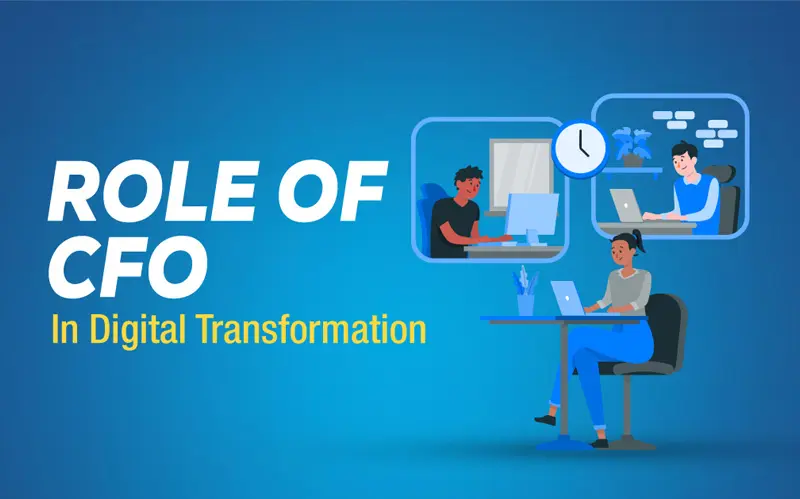In an era where technology reshapes every aspect of business, digital transformation has become a strategic necessity rather than an optional upgrade. the role of CFO in digital transformation has evolved significantly, placing them at the forefront of strategic innovation and technological integration within organizations.
CFOs, traditionally seen as gatekeepers of financial health, are now pivotal players in steering these digital initiatives. This blog explores how Virtual CFO Services in India are instrumental in guiding businesses through the complexities of digital transformation.
Defining Digital Transformation
Digital transformation involves integrating digital technology into all areas of a business, fundamentally changing how you operate and deliver value to customers. It’s also a cultural change that requires organizations to continually challenge the status quo, experiment, and get comfortable with failure. For many businesses, especially startups and SMEs, this shift is both an opportunity and a challenge, making the role of a CFO crucial.
The Evolving Role of the CFO
As businesses navigate the digital age, the role of the CFO has evolved significantly. No longer confined to managing numbers, CFOs are now strategic partners in driving organizational change. With a unique oversight of the company’s financial and strategic operations, CFOs, particularly Virtual CFOs, are well-positioned to influence and drive digital strategies that align with long-term business goals.
Key Responsibilities of the CFO in Digital Transformation
1. Strategic Leadership
Virtual CFOs are not just financial overseers but strategic leaders. They play a critical role in defining the digital strategy, ensuring that digital investments align with the business’s broader strategic objectives.
2. Financial Planning and Analysis
One of the primary roles of a Virtual CFO in digital transformation is to manage the financial aspects of technology investments. This includes budgeting for new technologies, forecasting ROI, and ensuring that digital projects are financially viable.
3. Risk Management
Digital projects come with their inherent risks, including cybersecurity threats and the challenge of integrating new and legacy systems. Virtual CFOs assess these risks and ensure that the business has the right controls and response strategies in place.
4. Data Governance
As businesses become increasingly data-driven, managing the integrity and security of data is crucial. Virtual CFOs oversee the governance of data, ensuring compliance with regulations and helping to prevent breaches that could jeopardize the business.
5. Performance Metrics
With digital transformation, businesses often need to redefine their performance metrics. Virtual CFOs are at the forefront of establishing new KPIs that accurately reflect the performance and health of digitally transformed business processes.
6. Challenges Faced by CFOs in Digital Transformation
Virtual CFOs face several challenges in digital transformation, from ensuring technology investments align with business objectives to managing the security and privacy of digital data. Moreover, staying abreast of rapidly changing technologies requires constant learning and adaptation.
Case Studies: Successful Digital Transformation Led by CFOs
Case Study 1: E-commerce Platform
An e-commerce startup engaged Outsourced CFO Services from EaseUp to oversee its digital transformation strategy. The Virtual CFO played a pivotal role in integrating advanced analytics for customer behaviour analysis, leading to a personalized shopping experience and a 30% increase in sales.
Case Study 2: Manufacturing Firm
A mid-sized manufacturing firm utilized EaseUp’s Virtual CFO Services to automate its production processes. The Virtual CFO facilitated the transition, managing the financial outlay and ensuring the technology integrated seamlessly with existing processes, resulting in a 50% increase in production efficiency.
Best Practices for CFOs in Digital Transformation
Virtual CFOs should:
- Collaborate closely with IT departments to align financial and tech strategies.
- Invest in their continuous education to stay ahead of technological advances.
- Implement a phased approach to digital transformation, starting with small, manageable projects.
Conclusion
In conclusion, the role of CFO in digital transformation is indispensable as it bridges the gap between traditional financial management and modern, digitally-driven strategic planning, ensuring businesses not only survive but thrive in the digital age. With our unique oversight of financial and strategic aspects, we can drive significant value in adapting businesses to the digital age. For startups and SMEs, leveraging the expertise of a Virtual CFO from services like EaseUp can provide the necessary guidance and support to ensure successful digital transformation.
Take Action: Transform Your Business with Virtual CFO Guidance
Is your business ready to embark on a digital transformation journey but unsure where to start? Contact EaseUp today, and let our expert Virtual CFOs guide you through every step of your digital transformation. Our customised services ensure your financial strategies align perfectly with your technological investments, driving growth and innovation.








